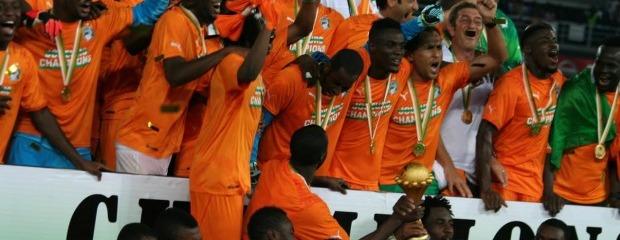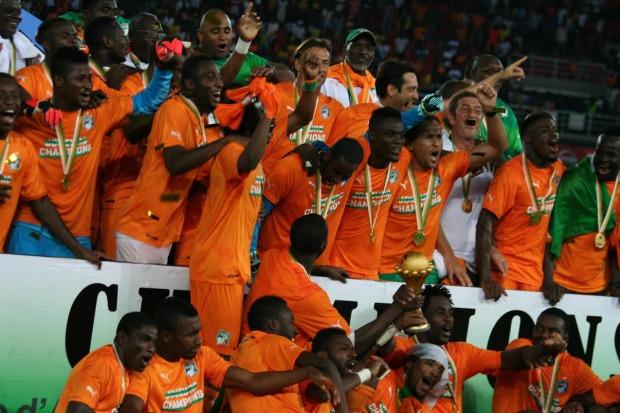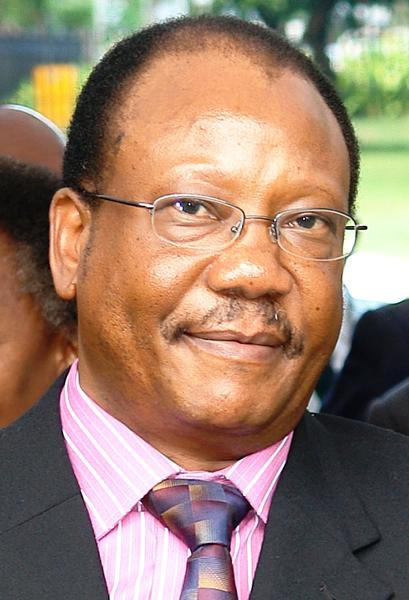Africa Cup of Nations 2015: the show must go on – By Taimour Lay


Ivory Coast players and coaching staff celebrate winning the African Cup of Nations in Bata, Equatorial Guinea (Taimour Lay).
Bata, Equatorial Guinea – The continent’s showpiece football tournament, which ended with Ivory Coast taking the trophy on Sunday night after a penalty shoot-out win over Ghana, deserves respect and criticism in equal measure.
The Africa Cup of Nations [AFCON] semi-final on 5 February looked certain to be abandoned. As bottles and rocks rained down on to the pitch in Malabo, the players dared not risk a dash to the tunnel, instead huddling near the centre-circle. Hundreds of Ghana fans, displaced from their seats by the Equatoguinean onslaught, stood trapped on the running track, pelted by missiles while a military helicopter hovered dangerously low above the stadium, smoke bombs rising behind them.
But – remarkably – forty minutes later, the game re-started, with no one complaining that the referee played just three of the 10 minutes that remained before blowing his final whistle to confirm Ghana’s 3-0 win.
“The show must go on” might be the AFCON motto. When Morocco pulled out as hosts in November 2014 citing fears over Ebola, Issa Hayatou, president of the Confederation Africaine de Football [CAF], insisted the tournament had to go ahead on time, even lining up Qatar as an
option if the late appeal to President Teodoro Obiang of Equatorial Guinea had not borne fruit. “We cannot sign our death warrant,” he said. “If we postpone this event, it will be very deadly for African football.”
For all of his characteristic bluster, Hayatou was expressing a widely held view: institutional continuity and history count for something. The Cup of Nations is now in its sixth decade. It is older than the European Championship. Solutions are found whatever the circumstances [South Africa stepping in to replace Libya as hosts in 2013, for example]. It has never been postponed. Sponsorship and lucrative television deals reflect a growing global interest – but also create strong incentives for contracts to be fulfilled. Africa’s best players “˜come home’, resisting pressure from club elites who would rather their employees did not miss critical winter weeks of the European league campaign. If AFCON’s credibility is undermined, the calls for “compromise” over scheduling would become louder.
And so with just 50 days’ preparation, Equatorial Guinea were charged with hosting Africa’s leading competition, knocking up last-minute stadia in the remote interior of what is normally a closed and highly repressive country.
Support for AFCON can co-exist with criticism of CAF, an organisation led by Cameroon’s Hayatou since 1988. Since his unsuccessful attempt to unseat Sepp Blatter at Fifa in 1992, Hayatou has cleaved close to his former rival, benefitting in turn from the Goal programme which has seen millions of “development” dollars distributed to Africa’s associations. The challenge to Hayatou likely to emerge from South Africa and Nigeria is still offset by his support across the Francophone bloc – and from the Maghreb, although a breakdown in relations with Morocco, banned from the next two AFCONs for refusing to host, may change that dynamic.
Equally, fans and journalists here cannot be blind to the nature of the Equatorial Guinean regime, though no more or less than they should be about Russia which will host the World Cup in 2018. Almost all major sports events are adulterated by the reality of politics and finance which sustain them.
It takes no especial exercise in cognitive dissonance to see AFCON as both a genuine celebration of African football and a political showpiece deserving of criticism. “When something bad happens in Europe, they say it’s an error. When something happens in Africa, they begin talking about corruption… The western media are simply here to perpetuate colonisation,” said Hayatou after the Malabo semi-final in a wrong-headed attempt to deny this contradiction.
EG has hosted at a time of acute economic distress, with oil revenues down by 30%, a spiralling budget deficit and infrastructure projects mothballed across the country. If the capital Malabo and port city of Bata are totems to the distorted effects of oil, the town of Mongomo, which hosted South Africa, Ghana, Algeria and Senegal in Group C, reveals the regime’s insular power structure – this is where the Obiang family build their mansions and project their self-image, in the form of a vast basilica, luxury hotels and an unused international-standard golf course.
When home fans threw stones at police in Bata on 21 January, and caused chaos during the semi-final two weeks later, outsiders were given an insight into the latent frustrations of a young, impoverished population. Such displays of collective public disorder, as distinct from coup attempts, are unprecedented since at least the anti-Spanish riots of 1969. “I don’t think it was political,” a radical activist told me in Malabo. “But people have seen that you can challenge the security services and stand together. It may take a long time but it may be the start of a change in consciousness.”
It could also lead to renewed repression. The regime’s preferred model for transition – from Obiang to his controversial son “˜Teodorin’ – is Gabon [Ali Bongo succeeding his father in 2009] but senior government officials told me that recent turmoil in Burkina Faso has been watched closely.
The violence in Malabo stadium certainly surprised the security forces. What caused it is another question. Equatoguineans spoke fervently, if wholly unreasonably, of being “cheated” by the referee and the malign influence of “external forces” to which they were reacting, as if the paranoid rhetoric the government uses against its own perceived enemies [Spain, in particular] has filtered into wider social attitudes.
“We opposed AFCON because of the cost and because Obiang has used it to improve his international image,” says opposition leader Andres Esono Ondo from his scruffy office in downtown Malabo. Downstairs, the latest edition of La Verdad, the party newspaper, was being prepared for covert distribution. “But, of course, when I’ve watched the games, my grandchildren have been jumping around and celebrating.”
Within that tension, the tournament has, for the most part, been a success, defined by events on the field rather than off it: Equatorial Guinea’s shock advance to the last four, the DRC’s third-place finish; but most of all, Ivory Coast’s emotional win in the final after 23 years of near-misses.
The abiding memory of AFCON 2015 will not be of Hayatou, Obiang and Sepp Blatter smiling awkwardly on the podium – but of Boubacar Barry, the Ivory Coast goalkeeper, 35 years old, weeping with joy on the Bata stadium running track.
Taimour Lay is a journalist and human rights barrister. @TaimourLay






